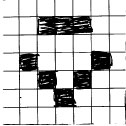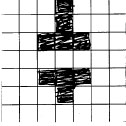LATITUDE 33° 11' NORTH, LONGITUDE 40° 28' WEST
Gabriel Blackwell
The frangibility of all arrangements, first to nth is ab initio, innate; still, some initial arrangements achieve persistence, seem to promise a kind of permanence. The Teignmouth Electron, for instance:

Discovered adrift, having scudded south and west hundreds of miles from its last manning, somewhere in the wisps of the Sargasso Sea. Our first commandment, according to which we accommodate our desires: every one of us with two or more neighbors—squares occupied by others—survives. Its corollary: the solitary and the binary, adrift or a dué, must perish. This one drifts, static, wooden, ignorant of commandment and now command, no longer inspirited. Threat of death lifted; purpose, life, same:

Once, though, it sailed not unmanned, departing friendly shores not for foreign, but for same. From Teignmouth harbor into the English Channel and out into the Atlantic, thence around the world without port, without pause, sails aiming prow Teignmouth-ward around a horn and around another:

Aboard—a man, a plan, a canal of unbelief, Donald Crowhurst. Not ignorant of the Board, only of its boundaries, therefore, like us, a trespasser. Forgive. Begin play with Crowhurst and his family, Crowhurst and his backers. There are so many of each. Clare, the wife. Stanley, the bankroll. James, the son. Rodney, the tout. An approximate arrangement, then, course plotted, Crowhurst as yet unhorned:

Or simply unpricked. Seeming solid, outfitted just so, Crowhurst and the Electron set sail. There has not been time for the ample provision of the planned push-off: the hull is hollow, this Electron not negatively- but un-charged. Captain Ludd rather than Victor Frankenstein, Crowhurst is aboard a hurried, race-occasioned rattle-trap, a singlehanded Trojan horse hamstrung before put to its paces. Once on its gait, it will only limp. The hatch opens. Mother and children watch from the shore; Crowhurst only curses:

A corollary to our corollary: any token with four or more neighbors perishes for want of light and air, shut up, buried alive. Asea, Crowhurst is alone with Einstein's Relativity and maps of oceans he will never swim. Pages of log given over to its dissection, physics is stopped mid-sentence: a eureka! reached between the lines, a prayer substituted for a proof. The way home perhaps not necessarily a circumference, perhaps instead a chord: could it be garroted, this globe? Anatomy the near endpoint, being the far, maybe this expanse, too, E=mc2, starts its shortest distance with a stone's weight converted to velocity with a single step into the sea. Prayer interrupted (pagination most likely—could it instead be specter, disaster?), does his frayed hand continue off the page into a fourth logbook where a conclusion is reached, a solution clutched tight as Mermeros by Medea at Crowhurst's auto-revenge? For now it merely claws at the void. It draws nothing back. Crowhurst's living children, at home with Clare, wait some word, seem almost to back away:

All they have had so far, but for its multiplying variables, would not equip a quadratic equation with adequate members. Rodney and press compute and recompute; starved for input, they increase their out. A solo circumnavigation, done once before but not, they point out, without putting ashore. A minimum, then, of six months solo, alone, solitary; lap and thunder the captain-and-crew's only companion. Two-by-two bypassed, no dove and no Ararat in sight:

Do you see that anticipation ashore has grown, nearly doubled in a single move? Paranoid, it huddles: if there is a point, it, along with all desire to press on, has been blunted. Stalled off the coast of Brazil, incontinent or incompetent, the Teignmouth Electron pulls briefly into port, its helmsman apostate, thus far prostrate before race and rule. An all-too-brief Babel results, a clumsy, misapprehended prodigality invoked. A day later, boat patched but jealous of company, stalled in the same waters, the captain amends his log—"Heading Digger Ramrez," adding a horn and many miles to his actual trajectory. Having come thus far south, Teignmouth Electron vaults its X-axis, has only the same distance to cover north:

Covenant broken, Teignmouth Electron, repaired, seems diminished somewhat, somehow debilitated. The boreal craft looks to be missing a member, does it not? Nevertheless, it has its purpose once again. No longer flying flat, it raises sails in the direction it had departed at race's opening. Eschewing the horn and then eschewing the other, it has described of itself not the prescribed circle but a line, terminated and then rerun, its terminus also its origin. At home, the sea is already parted. Does it wait Moses or Jonas? The Teignmouth Electron slows, as though to contemplate the question, after its pretended transit of the South Seas. The captain has set aside all hope to seem a world-beater, wishes instead for second, grace. Even the distant third, Holy Ghost, will do. All too soon, as we see, transubstantiation in reverse, flesh invested in word, logbook dragged down into the deep:

For there is only the boat and that poor, restless trinity still ashore, tout having taken his leave along with temptation. Along with something else, it seems: missing two members, the shore party stands apart. What separates them? Towed to the Caribbean, delivered from evil, the Teignmouth Electron births a secret: coordinates manufactured, Pacific never broached, captain unstable, missing. It is a virgin birth, the third and final commandment: a lacuna in the grid bounded by three gravid squares—no more and no less—is counted a delivery, inked in joyous bounty: hope, though it will be at the expense of sense (something from nothing in violation of Einstein's equation):

Speed the only constant, the voyage not after all a circumnavigation but a piercing or a transcending, the blip on the horizon has fallen through the plane or been lifted off it. In that single move, those ashore realize the truth, cease to wait a homecoming. No matter which shore he now touches, Crowhurst's passage is final; the logbooks left behind merely rearrange:

Kingdom:

Power:

Glory:

Amen.
__
John Conway's "Game of Life" (b. 1970) is a zero-player game. The Teignmouth Electron (b. 1969) can be found at 19° 41' 10.40" N by 79° 52' 37.83" W. Donald Crowhurst (b. 1932) cannot.
![[ToC]](11_1toc2a_t.jpg)